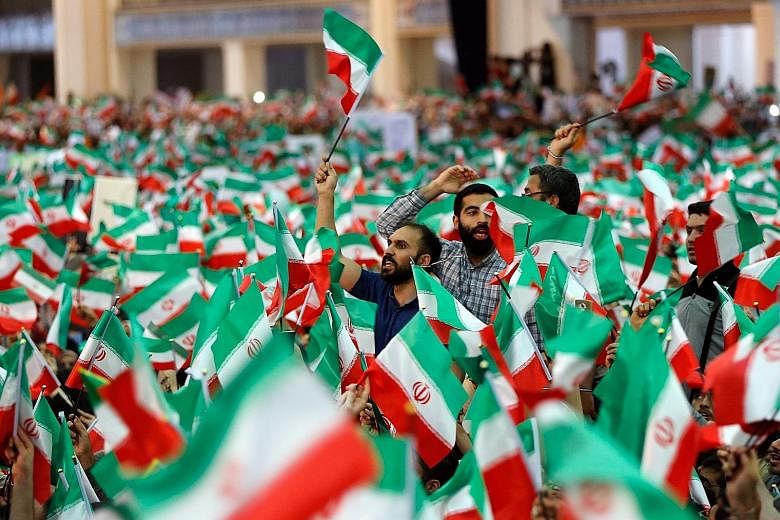TEHERAN • Iranian voters will decide the fate of moderate President Hassan Rouhani and his policy of engagement with the West tomorrow as he goes head-to-head with hardline cleric Ebrahim Raisi.
Mr Rouhani has spent four years trying to pull Iran out of its global isolation, reaching a 2015 deal that ended some sanctions in exchange for curbs on its nuclear programme. But as United States President Donald Trump threatens to scrap the deal, the detente looks in jeopardy.
Mr Raisi has agreed to stick by the nuclear accord, but says Mr Rouhani put too much trust in the West.
The election became a two-horse race after the other leading conservative, Teheran Mayor Mohammad Bagher Ghalibaf, dropped out on Monday and threw his support behind Mr Raisi. The field narrowed further on Tuesday when First Vice-President Eshaq Jahangiri pulled out and endorsed Mr Rouhani.
Iran's more historically reliable opinion polls indicate Mr Rouhani is likely to win.
Yet his conservative challengers have put up a stronger fight than many expected. Hardliners have savaged his economic record, saying his diplomatic efforts have done little to tackle poverty and unemployment.
Mr Raisi is seen as the preferred choice of the powerful security establishment, advocating a more self-sufficient "resistance economy" rather than a reliance on foreigners.
-
Key issues in presidential election
-
Here's a look at some of the key issues that analysts say would figure prominently in the polls.
VOTER MOTIVATION
Re-election for President Hassan Rouhani will hinge on persuading enough Iranian liberals, known as reformists, to back him.
Low turnout in 2005 handed the election to conservative Mahmoud Ahmadinejad. Reformists came out for Mr Rouhani in 2013, as did many rural voters. But will they do so again?
RISING COSTS
The cost of living is going up and while wages have risen for most Iranians, it has not been enough to compensate.
Mr Rouhani is campaigning on his economic record and especially on bringing down inflation from above 30 per cent in the later Ahmadinejad years to about 9 per cent now.
FOOD PRESSURE
The average Iranian household is now eating less meat, dairy products and other basic foodstuffs than in 2005. That is an electoral problem for the government, which supported the 2015 nuclear deal with the promise of lifting sanctions and an expected boost to living standards.
CRUDE PRICE SLUMP
The nuclear deal allowed Iran to double its oil exports, but global oil prices have collapsed. Current revenue is lower than during the worst of the sanctions era, giving Mr Rouhani less cash to redistribute or invest.
OUT OF WORK
Economic growth has stabilised at about 4 per cent - far from the 6.6 per cent contraction the year before Mr Rouhani took office.
That has not yet translated into more jobs - unemployment has been rising in recent years - in large part because the key non-oil economy has not kept pace.
NON-OIL FLOP
Iran's non-oil economy, the main engine for job creation, contracted in 2015 and barely grew last year. That is partly because, even as the inflation rate fell to single digits, competition among banks to attract deposits kept real interest rates high. The International Monetary Fund has recommended "urgent action" to recapitalise and restructure lenders.
RIAL VALUE
Iranians like the US currency. The rial's exchange rate against the dollar has always been an important indicator of how the economy - and they themselves - are doing. Under Mr Ahmadinejad, the rial crashed, reducing purchasing power. Official and street rates are now more in alignment but the rial has not recovered its lost value.
BLOOMBERG
Mr Rouhani has made thinly veiled references to Mr Raisi's past as a prosecutor during the 1980s when many dissidents were executed: "We've entered this election to tell those practising violence and extremism that your era is over."
Mr Rouhani says he needs more time to rebuild the economy, shattered by years of sanctions and mismanagement when he took over in 2013.
"At the halfway point, we don't turn back," he tells voters.
He has vowed to work towards removing the remaining non-nuclear sanctions imposed by the US that have strangled Iran's efforts to sign trade deals with European and Asian countries.
While Iranians largely welcomed the reduced tensions with the West, the ongoing economic slump has taken a toll on morale. Nonetheless, many voters, particularly wealthier urbanites, are attracted to Mr Rouhani's promise of greater social freedoms.
Still, unemployment is officially stuck at 12.5 per cent - close to 30 per cent for the young - and many more are under-employed or struggling.
"My cheques keep bouncing," said Mr Babak, a clothing supplier in south Teheran. "I may vote, but I know it doesn't change anything."
AGENCE FRANCE-PRESSE

